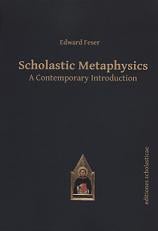 Prof. Ed Feser’s latest book is Scholastic Metaphysics: A Contemporary Introduction. I think enough of Prof. Feser that I pre-ordered it a couple of months before publication; and when it arrived I began reading it on my lunch break and other odd moments. I find that that’s the right approach for books of philosophy; I can’t take it all in at once, I need time to ponder and let things settle.
Prof. Ed Feser’s latest book is Scholastic Metaphysics: A Contemporary Introduction. I think enough of Prof. Feser that I pre-ordered it a couple of months before publication; and when it arrived I began reading it on my lunch break and other odd moments. I find that that’s the right approach for books of philosophy; I can’t take it all in at once, I need time to ponder and let things settle.
First, some background. Scholastic philosophy is the philosophy of the “schoolmen” of the Middle Ages. These days the most prominent of the schoolmen is St. Thomas Aquinas, but there were many others, including such figures as Thomas’ friend St. Bonaventure (a Franciscan), John Duns Scotus (from whose name, used in the ironic sense, we get the word “dunce”), and William of Occam, he of the much touted razor.
Scholastic philosophy remained dominant in the West until the days of Descartes, who decided that it was too complicated and well overdue for a reboot. It was later revived in the days of Pope Leo and in the 20th Century found defenders like Jacques Maritain, Reginald Garrigou-Lagrange, and Etienne Gilson; and now, in the early 21st Century, Ed Feser (among others). Feser’s point is that Scholasticism was never disproved; rather, it was abandoned, and it is worth rediscovering. On his view, many of the standard problems of modern philosophy (e.g., the “mind-body” problem) are quite adequately answered by Thomism, and indeed would never have seemed problematic.
Feser has written quite a lot about Scholasticism in the past, particularly in his book Aquinas, which is an introduction to Thomas Aquinas and his philosophy, and in The Last Superstition, a perhaps overly polemical refutation of the “New Atheists”. The current book is broader in its intent, and much less polemical. Viewing Scholasticism, and more particularly Thomism, as a live option for the 21st or any other century, Feser’s goal is to give an introduction to Scholastic thought, placing it in context with respect to other more popular schools of philosophy. In this particular book he’s focusing on metaphysics, the study of Being itself; I gather that it is intended to be the first of several.
For each topic, then, Feser follows more or less this plan: he presents the Thomist view; then he talks about the views of Duns Scotus and other prominent scholastics (where they differ with Thomas) and explains why he finds the Thomist view to be the correct one; and then he relates the whole to other modern strains of philosophy, some of which are beginning, slowly and painfully, to accept as necessary, ideas that Thomas would have found commonplace.
Me, I not only enjoyed the book thoroughly, I wanted more. I recognize that I am, perhaps, not typical in this regard. (Ahem.)
For those, though, who are philosophically minded, and who want to explore the ideas I’ve been discussing in my posts on St. Thomas Aquinas over the last couple months, I recommend it highly. It should perhaps not be the first book you read, though. I’d suggest tackling Jacques Maritain’s Introduction to Philosophy first, and probably Feser’s Aquinas. You might also enjoy reading G.K. Chesterton’s Aquinas: The Dumb Ox, which is more about the man and less about the philosophy, but which is eminently sane.












